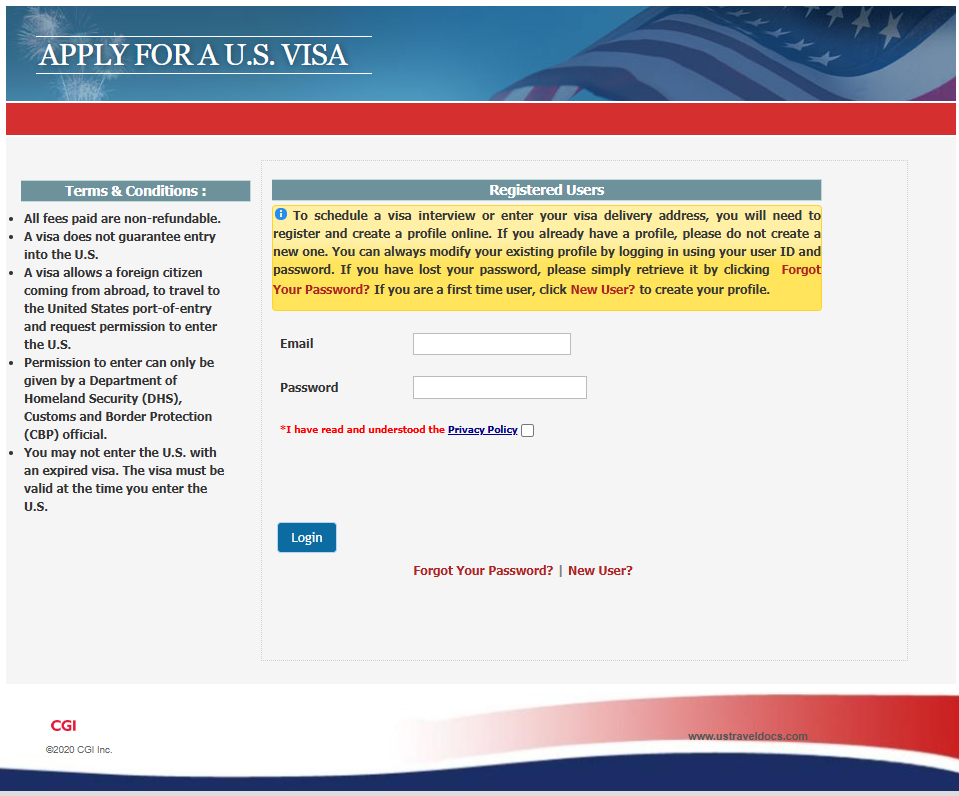Scheduling a U.S. visa interview can be a stressful process on its own, but finding out that your account on the U.S. Appointment Portal has been hacked can feel devastating. Unfortunately, it’s a scenario many students and applicants face, often because they share login details with third-party agents who claim to help but then exploit the account for personal gain. Here’s a straightforward guide to help you regain control of your account if it’s been compromised, all without paying any extra money to anyone.

US Travel Docs – Apply for Visa Interview Portal: https://portal.ustraveldocs.com
Step 1: Take a Deep Breath
If your account has been hacked or your credentials misused, it’s easy to panic. Remember, this situation can be resolved, and you can regain access to your account without having to negotiate or pay anyone further.
Step 2: Contact U.S. Travel Docs Support
The best way to regain control is to contact the official support team at support@ustraveldocs.com. In your email, explain that your account has been compromised and request an email change for your account.
Here’s a sample email template:
Sample Email to U.S. Travel Docs Support
Subject: Request to Change Email for U.S. Appointment Portal Account
Hello U.S. Travel Docs Team,
I would like to request an email change for my U.S. Appointment Portal account, as my previous email has been compromised. I have attached a scanned copy of my passport for verification.
- Old Email: [Your Old Email]
- New Email: [Your New Email]
Thank you for your assistance, and I look forward to your response.
Regards,
[Your Full Name][Your Passport Number, if applicable]
Step 3: Attach Your Scanned Passport
Attach a scanned copy of your passport to the email to verify your identity. This step ensures that the support team can process your request more efficiently. If they require additional information, they will respond to your email.
Step 4: Await a Response
After sending the email, the U.S. Travel Docs support team should respond within a few days. They may either confirm the email change or ask for additional information if needed. Once confirmed, your email will be updated, and you’ll regain access to your account.
Preventative Tips for the Future
- Avoid Sharing Login Details: Always keep your portal login details private and avoid using third-party agents who claim to assist with scheduling.
- Use a Strong Password: Strengthen your account’s security by using a strong password and consider changing it periodically.
- Verify the Source: Only use official resources and email addresses from the U.S. Embassy or U.S. Travel Docs for any support.
Check out “Documents Required for US F1 Visa Interview“
In Summary
Getting hacked is a lesson learned, but it’s not the end. By contacting U.S. Travel Docs support, you can regain control of your account without paying any ransom. Now, you’re ready to move forward with your U.S. visa interview plans confidently and securely.
Good luck with your visa journey! We hope this guide has helped you get back on track and feel more prepared.
1. What should I do if my U.S. Appointment Portal account is hacked?
If your account has been compromised, don’t panic. Contact U.S. Travel Docs support at support@ustraveldocs.com with a request to change your registered email. Provide a scanned copy of your passport as proof of identity.
2. Can I recover my account without paying anyone?
Yes, you don’t need to pay anyone to recover your account. Simply email U.S. Travel Docs support and follow the verification process to regain access.
3. How long does it take to get a response from U.S. Travel Docs support?
Typically, U.S. Travel Docs support will respond within a few days. They may either confirm your email change or request additional information.
4. What information should I include in my email to U.S. Travel Docs?
Your email should include your old and new email addresses, a scanned copy of your passport for verification, and a brief explanation of the account issue.
5. How can I protect my U.S. Appointment Portal account from being hacked again?
Avoid sharing your login details with anyone, especially third-party agents. Use a strong, unique password and consider changing it regularly for added security.






